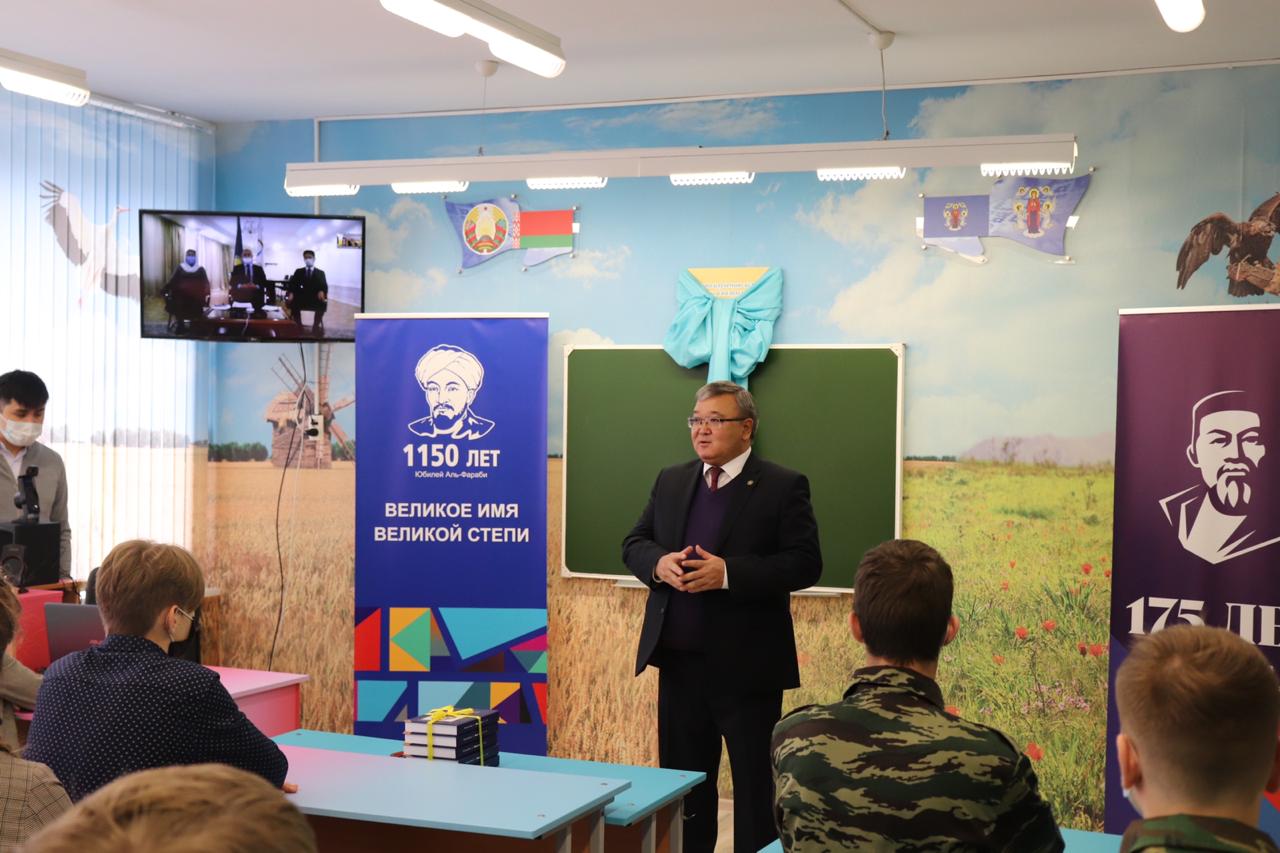
On November 20, the al-Farabi Kazakh language, literature and history study room was opened at the M. Auezov Secondary school No. 143 in Minsk.
The opening ceremony was attended by Ambassador extraordinary and Plenipotentiary of the Republic of Kazakhstan to the Republic of Belarus Askar Beisenbayev, head of the Zavodsky district administration Sergey Maslyak, Vice - President of the Otandastar Foundation Magauiya Sarbasov and Adviser to the President of the Otandastar Foundation Bolat Didar. The school's guests were welcomed by 10th grade students Nikita Shalay and Violetta Drozd, who performed a musical and poetic composition based on poems by Kazakh thinker, poet and musician Abay Kunanbayev and Belarusian poet Maxim Tank. Ambassador A. Beisenbayev thanked the head of the administration of the Zavodsky district of Minsk S. Maslyak for participating in the event and paying special attention to school No. 143, named after the classic of Kazakh literature M. Auezov. It is noteworthy that the address of the school is 5 M. Auezov street. the Integrated approach Of the administration of Minsk, Zavodsky district in perpetuating the memory of the Kazakh writer, who created his immortal works three and a half thousand kilometers from the capital of Belarus, causes deep gratitude of Kazakhstanis, creates a sense of unity of two fraternal peoples.
The Ambassador spoke about a new project implemented by the Embassy of Kazakhstan in Belarus together with the Otandastar Foundation to open a study room for the Kazakh language, literature and history. Its premises have undergone reconstruction, everything in it, including the design, is subordinated to the idea of mutual friendship and cooperation between Kazakhstan and Belarus. In order to make the study of the Kazakh language, history and literature of Kazakhstan more interesting and effective, the Kazakh side gave the school a large-format TV, interactive textbooks, dictionaries, and educational literature. The Ambassador focused on the personality of the person whose name was assigned to the new Cabinet - Abu Nasr al-Farabi, who was born in 870 in the town of Farab, near the city of Otyrar, located in the Syr Darya river basin in the South of modern Kazakhstan. In the middle ages, this city was a scientific and cultural center, located at the crossroads of trade routes, connecting East and West.
A. Beisenbayev noted: "the Phenomenon of al-Farabi is that the scope of his scientific interests was extremely wide, it is no coincidence that he was called an encyclopedic scientist. His scientific heritage is of global significance, and he made a fundamental contribution to the development of not only philosophy, religion, logic, ethics, but also mathematics, chemistry, biology, astronomy, medicine, and law. Al-Farabi translated into modern languages the works of ancient scientists-Aristotle, Plato, Euclid, and other ancient Greek thinkers." Addressing the school children, the Ambassador stressed that the whole enlightened world knows the name of al-Farabi. His extraordinary abilities helped him achieve such fame, but the fact that he spoke many languages played an important role. "I am sure that the knowledge gained in this class will be useful to you in your future studies, on your life path, and will help you become successful people," A. Beisenbayev said.
The head of the administration of the Zavodsky district S. Maslyak noted the importance of cultural and humanitarian cooperation, educational exchange between Kazakhstan and Belarus to strengthen bilateral ties. The head of the district administration stressed that school No. 143 has deep and multifaceted traditions, among which the Kazakh vector is one of the richest, most interesting and dynamically developing. He expressed gratitude to the Embassy of Kazakhstan in Belarus for implementing an important and interesting project to study the Kazakh language, literature and history. Director of the school Dmitry Bocharov noted that the friendly relations of Secondary school No. 143 in Minsk with Kazakhstan were established in 1998, and 11 years later it was named after M. Auezov. Thus, a bridge of friendship between the two countries was laid, thanks to which many students of the school visited Kazakhstan, and Kazakh delegations include its visit in the schedule of their visits. In particular, the Prime Minister of Kazakhstan Karim Massimov visited the children in 2011.
Heads of the Kazakhstan Foundation "Otandastar" - Vice-President M. Sarbasov launched the project of online learning of the Kazakh language. The first lesson for children was conducted by Aina Alpysbay, a teacher of the Kazakh language, the author of the project "QazWrite", thanks to which representatives of the Kazakh Diaspora, businessmen, ordinary people in various countries of the world had the opportunity to learn the Kazakh language remotely. The guests also visited the art exhibition "We are different, but together", where students of the school presented more than 50 drawings and crafts, and Junior school students – multimedia presentations. The exhibition is traditionally held at the end of the year as part of the contest "What do I know about Kazakhstan?", dedicated to the Independence Day of Kazakhstan. There was an audition of poetic works, including author's works, prepared by students in the framework of the readers ' contest "Belarus-Kazakhstan", as well as the defense of scientific essays written by high school students. It is noteworthy that there is a competition in which not only children, but also their parents participate called "Belarus-Kazakhstan-bridge of friendship". The program " What? Where? When?", dedicated to the Kazakh-Belarusian cooperation.
This was also announced on the information portal "EGEMEN QAZAQSTAN".